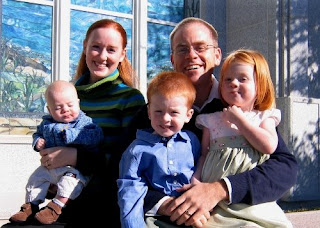I disappoint myself daily in my quest for perfection (see
Matt. 5:48). I know what I would like to do and who I want to be like, but I continue to fall short. Nevertheless, instead of giving up hope and condemning myself, I continue to try again (and again, and again). However, I've noticed that I sometimes don't give to others the fresh starts that keep me going. I tend to be like Mr. Darcy in Austen's
Pride and Prejudice: "My good opinion once lost, is lost forever."
I need to change.
I remember the words of Christ: "For with what judgment ye judge, ye shall be judged: and with what measure ye mete, it shall be measured to you again" (
Matt. 7:2). Clearly I need to "be of the same mind, one towards another" (
Romans 12:16) and have charity, compassion, and forgiveness.
How can I expect perfection of myself and not expect it in others, too?
I think the answer comes from realizing that while I expect perfection, I will and do fail. Yet I still try again—meaning that I forgive myself (after seeking forgiveness). Hence, I should apply the same to others and forgive.
Elementary.
What obligation do I have to help others to be perfect? Is it prudent for me to correct others? (I really wonder about this.) The charge to "work out your own salvation with fear and trembling" (
Phil. 2:12) casts an individualistic light on the discussion, and leads many to believe that others, and ourselves, are entirely alone in our efforts to be like Christ.
This is wrong.
The Philippians scripture needs context. The next verse reminds: "For it is God which worketh in you" (
v. 13). The discussion on faith and works is aided by C. S. Lewis' observation:
Regarding the debate about faith and works: It’s like asking which blade in a pair of scissors is most important (link).
The Philippians verses suggest that in our work to be like Christ, we can expect help, even line upon line, precept upon precept (see
Isa. 28:10, 13 and
D&C 12:12). How wonderful and reassuring.
Now, returning to expectations for others, I'm reminded of a teaching technique that my friend uses when working with young men. Instead of expecting them to live at his level of understanding and action, he teaches them to live so that they can have the Spirit of God with them. His logic is that in order to have the Spirit, they will be living at the right level, doing what they're supposed to be doing. This might be different—either more or less—than his level of action and understanding, but although different, it is right for them. This understanding helps in judging, too. How can I judge others for doing what's right for them? I can't.
I was reminded of this approach when reading with my wife recently. We read
Romans 14:14 and had a discussion on personal understanding of commandments or ways of living. Look for the relationship to my friend's theory in the following:
I know, and am persuaded by the Lord Jesus, that there is nothing unclean of itself: but to him that esteemeth any thing to be unclean, to him it is unclean.
It seems that if we understand something to be wrong, then it is wrong. If we feel it is right, then it is right. We are aided by commandments and the words of the prophets, but we still need to be careful because this may lead to a broad-brush application on life where one can say that he feels right in doing wrong. You cannot do wrong and feel right, though.
Paul's context in Romans 14 was regarding judging and food. Briefly, I would like to say that I think it is interesting how many view LDS members' adherence to the
Word of Wisdom purely in the view of the thou shalt nots. I don't want to be defined by what I don't do or don't believe, but rather by what I do, who I am, and what I believe.
Interestingly, Paul's words from Romans 14 are the base of an application of the Word of Wisdom that my wife and I use. In the Word of Wisdom, principles of health are taught, and instruction is given to avoid specific substances, but debate and discussion continue on certain items (usually caffeine). I've represented, generically, the Word of Wisdom in the following graphic. One side shows good things, the other bad, with the topics of debate shown in the center.
Which side should caffeine be on? Many have asked this question. I echo Nephi: "Have ye inquired of the Lord?" (
1 Ne. 15:8). If the item hasn't made official church teachings but you're still curious or concerned, look to the source: Ask the Lord. If after asking you esteem caffeine unclean, stay away from it. If you feel that it is fine, go for it. This is a nice little application of Romans 14:14, but it can be applied to other things as well. (I personally avoid caffeinated drinks, but enjoy chocolate. Am I a hypocrite? Paul says no.)
We can involve the Lord in our lives, and follow his instructions to "look unto [Him] in every thought" and to "doubt not, fear not" (
D&C 6:36).
If I look to Christ in every thought, I will make progress in my quest for perfection, I will find forgiveness for myself and others, I will be happy, and I will become more like him—which is my ultimate goal.















 That's a lot of love.
That's a lot of love.





















 This emotional situation produced a fairly obvious comparison to our relationship with God. As I observed the similarities between Rebecca and me, and me and our Father, I wondered if I trust and love as much as I should. I think I'm quick to look up when I feel down, but do I love and trust as I ought? The need to be like a child resonates here (see
This emotional situation produced a fairly obvious comparison to our relationship with God. As I observed the similarities between Rebecca and me, and me and our Father, I wondered if I trust and love as much as I should. I think I'm quick to look up when I feel down, but do I love and trust as I ought? The need to be like a child resonates here (see 


